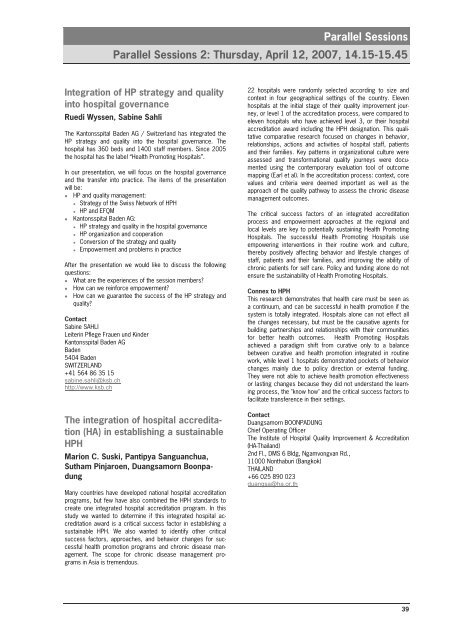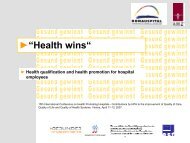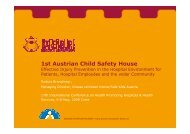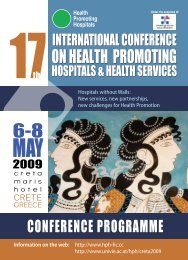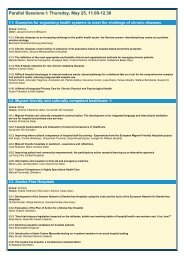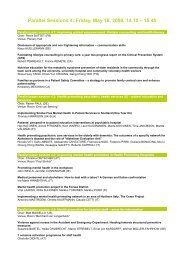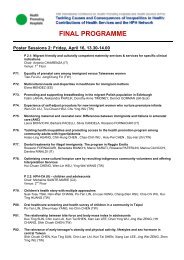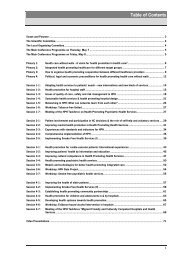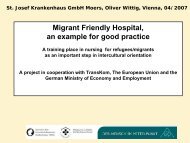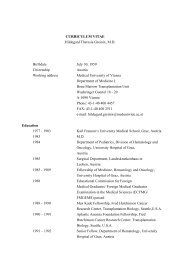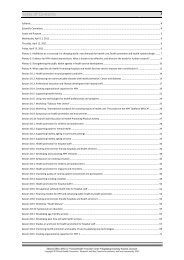Plenary 1: The Hospital – A Staff Empowering ... - HPH-Conference
Plenary 1: The Hospital – A Staff Empowering ... - HPH-Conference
Plenary 1: The Hospital – A Staff Empowering ... - HPH-Conference
You also want an ePaper? Increase the reach of your titles
YUMPU automatically turns print PDFs into web optimized ePapers that Google loves.
Parallel Sessions<br />
Parallel Sessions 2: Thursday, April 12, 2007, 14.15-15.45<br />
Integration of HP strategy and quality<br />
into hospital governance<br />
Ruedi Wyssen, Sabine Sahli<br />
<strong>The</strong> Kantonsspital Baden AG / Switzerland has integrated the<br />
HP strategy and quality into the hospital governance. <strong>The</strong><br />
hospital has 360 beds and 1400 staff members. Since 2005<br />
the hospital has the label “Health Promoting <strong>Hospital</strong>s”.<br />
In our presentation, we will focus on the hospital governance<br />
and the transfer into practice. <strong>The</strong> items of the presentation<br />
will be:<br />
� HP and quality management:<br />
� Strategy of the Swiss Network of <strong>HPH</strong><br />
� HP and EFQM<br />
� Kantonsspital Baden AG:<br />
� HP strategy and quality in the hospital governance<br />
� HP organization and cooperation<br />
� Conversion of the strategy and quality<br />
� Empowerment and problems in practice<br />
After the presentation we would like to discuss the following<br />
questions:<br />
� What are the experiences of the session members?<br />
� How can we reinforce empowerment?<br />
� How can we guarantee the success of the HP strategy and<br />
quality?<br />
Contact<br />
Sabine SAHLI<br />
Leiterin Pflege Frauen und Kinder<br />
Kantonsspital Baden AG<br />
Baden<br />
5404 Baden<br />
SWITZERLAND<br />
+41 564 86 35 15<br />
sabine.sahli@ksb.ch<br />
http://www.ksb.ch<br />
<strong>The</strong> integration of hospital accreditation<br />
(HA) in establishing a sustainable<br />
<strong>HPH</strong><br />
Marion C. Suski, Pantipya Sanguanchua,<br />
Sutham Pinjaroen, Duangsamorn Boonpadung<br />
Many countries have developed national hospital accreditation<br />
programs, but few have also combined the <strong>HPH</strong> standards to<br />
create one integrated hospital accreditation program. In this<br />
study we wanted to determine if this integrated hospital accreditation<br />
award is a critical success factor in establishing a<br />
sustainable <strong>HPH</strong>. We also wanted to identify other critical<br />
success factors, approaches, and behavior changes for successful<br />
health promotion programs and chronic disease management.<br />
<strong>The</strong> scope for chronic disease management programs<br />
in Asia is tremendous.<br />
22 hospitals were randomly selected according to size and<br />
context in four geographical settings of the country. Eleven<br />
hospitals at the initial stage of their quality improvement journey,<br />
or level 1 of the accreditation process, were compared to<br />
eleven hospitals who have achieved level 3, or their hospital<br />
accreditation award including the <strong>HPH</strong> designation. This qualitative<br />
comparative research focused on changes in behavior,<br />
relationships, actions and activities of hospital staff, patients<br />
and their families. Key patterns in organizational culture were<br />
assessed and transformational quality journeys were documented<br />
using the contemporary evaluation tool of outcome<br />
mapping (Earl et al). In the accreditation process: context, core<br />
values and criteria were deemed important as well as the<br />
approach of the quality pathway to assess the chronic disease<br />
management outcomes.<br />
<strong>The</strong> critical success factors of an integrated accreditation<br />
process and empowerment approaches at the regional and<br />
local levels are key to potentially sustaining Health Promoting<br />
<strong>Hospital</strong>s. <strong>The</strong> successful Health Promoting <strong>Hospital</strong>s use<br />
empowering interventions in their routine work and culture,<br />
thereby positively affecting behavior and lifestyle changes of<br />
staff, patients and their families, and improving the ability of<br />
chronic patients for self care. Policy and funding alone do not<br />
ensure the sustainability of Health Promoting <strong>Hospital</strong>s.<br />
Connex to <strong>HPH</strong><br />
This research demonstrates that health care must be seen as<br />
a continuum, and can be successful in health promotion if the<br />
system is totally integrated. <strong>Hospital</strong>s alone can not effect all<br />
the changes necessary, but must be the causative agents for<br />
building partnerships and relationships with their communities<br />
for better health outcomes. Health Promoting <strong>Hospital</strong>s<br />
achieved a paradigm shift from curative only to a balance<br />
between curative and health promotion integrated in routine<br />
work, while level 1 hospitals demonstrated pockets of behavior<br />
changes mainly due to policy direction or external funding.<br />
<strong>The</strong>y were not able to achieve health promotion effectiveness<br />
or lasting changes because they did not understand the learning<br />
process, the "know how" and the critical success factors to<br />
facilitate transference in their settings.<br />
Contact<br />
Duangsamorn BOONPADUNG<br />
Chief Operating Officer<br />
<strong>The</strong> Institute of <strong>Hospital</strong> Quality Improvement & Accreditation<br />
(HA-Thailand)<br />
2nd Fl., DMS 6 Bldg, Ngamvongvan Rd.,<br />
11000 Nonthaburi (Bangkok)<br />
THAILAND<br />
+66 025 890 023<br />
duangsa@ha.or.th<br />
39


